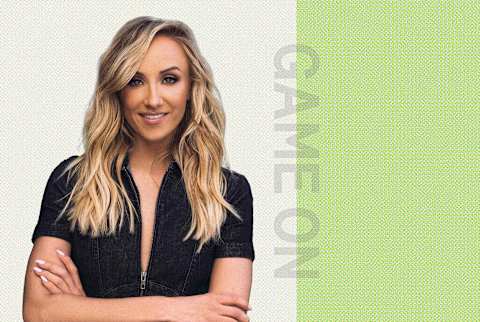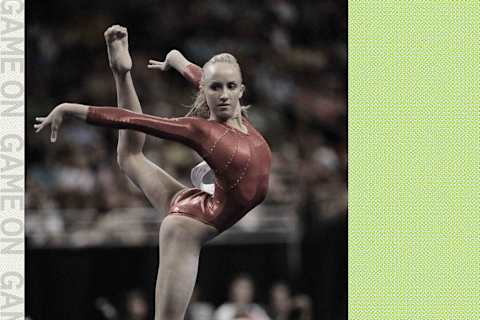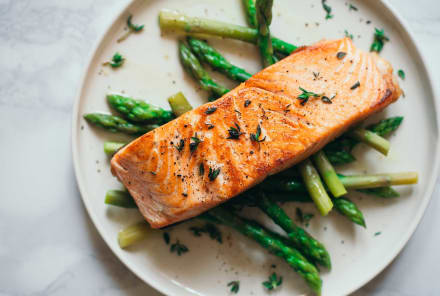Advertisement
How Olympic Gymnast Nastia Liukin Stays Fit & Centered During "Retirement"


During the 2008 Beijing Olympics, I remember watching star gymnast Nastia Liukin soar. Her strength and dedication led her to win a gold medal that year—adding to her collection that would total five Olympic medals by the time she retired.
But even after her champion career, Liukin has found ways to keep on soaring to new heights—this time showcasing several of her other talents off the mat. For example, she's served as an Olympic commentator for NBC, including for the 2020 Tokyo Games, and previewed the 2024 Paris Olympics for NBC. She's also become an entrepreneur, lifestyle influencer, and media personality who works with top outlets.
Here, how she's able to stay on top of her game—even in "retirement."
mindbodygreen: What does being a "strong woman" mean to you?
Nastia Liukin: Inner strength is the most important thing. For a long time, strength used to be just perceived as physical strength. But now strength isn't just about how much you can lift, how many squats you can do, or how many miles you can run—it comes from so many different things. That narrative has shifted and changed quite a bit in a positive way.
Not even as an athlete but as a woman, seeing this shift has been incredible. Especially with the last few Olympic Games, it's been great to see how these athletes have reinforced the importance of inner strength, mental strength, and mental health as a whole.
mbg: What meals help you feel strongest?
Liukin: Ever since I can remember, I have always loved breakfast foods, but I am never the person to wake up starving in the morning. When I was training, I had to force myself to eat right when I woke up because I had four to seven hours of training every single day.
I was always raised that food is your fuel. And to get the most out of your body, you have to fuel it with proper nutrition. Breakfast is the most important meal in that sense—and probably my favorite types of foods are breakfast foods.
I also believe that starting your day off right is really important—and not just with what you eat but the intentions you set for yourself. You can train your mind to think positive thoughts, and it really does wonders when you're able to shift your mindset to having those affirmations versus something negative. I like to frame it as, How can I make this day better than the day I had yesterday?
mbg: I love that. Using breakfast as a time to fuel not just your body but your mind.
Liukin: Setting the bar for the rest of the day!
mbg: Speaking of setting yourself up for a good day: sleep! I think a lot of us struggle with sleep. You're someone who has to sleep under an immense amount of pressure, and while you're traveling a lot, whether that's the night before competing in the Olympics or going on national television, how do you prioritize sleep amid the chaos?
Liukin: Sleep is the most important part of all of our days, or at least it should be treated that way. But it's not always easy to shut your mind off the night before a big event. In fact, shutting your mind off is probably one of the most challenging things for a lot of us.
We live in a world that's super digitally based and constant. It's not even just shutting your laptop off anymore because work is always on your phone too. The majority of my career is now on my phone, in the digital space. I have to make an effort to put my phone away for the night and not scroll before bed. I'm guilty of doing it every once in a while, but I really try not to because your mind is a sponge. It's definitely challenging at times.
Instead, it's important to prioritize having a nightly routine. In training for gymnastics or the Olympics, having a routine was extremely important for me. So I always go back to that.
I keep my routine the same no matter if I'm at home, away, in a hotel, before a work event, no matter what—I try to do the exact same thing. No matter what my day looked like and no matter what city I'm in. Having that routine is extremely beneficial, especially when you're not able to control the number of hours of sleep that you can get, the hotel bed, your environment, or whatever it is.
mbg: What does your workout routine look like nowadays?
Liukin: That was the hardest thing for me once I retired from gymnastics. It was just really trying to figure out what I even enjoy doing because all of my workouts were so centered and focused around doing the best gymnastics that I could.
Then all of a sudden, I didn't have anybody telling me what kind of conditioning or what my plan was for that day. So figuring that out was a lot of trial and error, to be completely honest. I had to find what I actually enjoyed doing just for myself.
For example, I'm not a huge runner. I really do wish I enjoyed it more, as I'm envious of the people who can go out for a long run and it can clear their head. I've never enjoyed it like that. But I ran almost every day while I was training.
So now, I prefer a long walk with my dog. I also like Pilates and hot yoga. Those are the two things that I probably enjoyed the most because it still feels very much like your own body weight.
mbg: So I wanted to ask you about transitioning in general. I know it can be really hard to retire from being an elite-level athlete. But on the outside, it does seem like you're this person who was able to flourish on the other side of your career.
Liukin: Well, first off, I'm flattered it looked seamless on the outside. But it's important to understand that we all go through transitions, right? Whether that's going from high school to college or graduating college to getting your first job. And it's not necessarily going to be smooth and easy.
For me, I wasn't expecting it to be a breeze, but the problem was I really didn't know what to expect at all because I didn't ever have a life without gymnastics in it—for as long as I can remember. So at the heart of the transition was a period of figuring out who I was as a person outside of gymnastics.
Once I was able to really think about my life for my own self—not for anybody else—and establish the kind of person I wanted to be, then I was finally able to think, What are my passions? What do I want to do?
What I realized was that having a goal for yourself is just so important. And it was something that my parents always taught me.
When gymnastics ended for me, there was a brief moment when I assumed I wouldn't have these goals as grand as going to the Olympics or winning a gold medal. Achieving success at an early age is incredible—don't get me wrong—but it can mean that the rest of the goals in your life feel smaller. So it was just about realizing that goals don't need to be as big as winning a gold medal. That you can be proud of yourself with smaller goals.

mbg: Honestly, I feel like that's very relatable advice, even for non-Olympians!
Liukin: Honestly, it's become even more of a challenge to remind ourselves of this because, again, we live in this very social-media-driven world. You're constantly comparing yourself to others and the people you see on the internet that you may or may not know. So it's important to remind yourself not to compare yourself with someone else and someone else's journey or timeline.
mbg: How do you decompress and take recovery time?
Liukin: I'm spending a lot of time in California right now. So the water, the ocean, is extremely calming. Around sunset, I take my dog and go for a long walk, which always helps me decompress a little bit.
And yoga helps me. When I was able to shift the mentality of "I'm going to work out because it's my job" to "I'm doing this because I enjoy it," I found it to be a totally different kind of workout.
And then I just love taking a hot bath, lighting a candle, and reading.
mbg: What advice would you give young athletes who have big dreams like you?
Liukin: The first thing I would say is to find something you're passionate about—not something you're doing because somebody else wants it for you. Truly define something that you love and that you're passionate about. Because we're all going to have those days in which it's exhaustion or you're frustrated. This doesn't have to be a sport, this can be a job, relationship, anything. But when you have that deep-down love and passion for something, it's easier to get through those challenging times.
mbg: And the second thing?
Liukin: My parents taught me this, and it stuck with me for the rest of my life. There were days that I came home and I wanted to quit because I had a bad day. And my parents would always say, "OK you can quit—that's totally fine, but not today." I'd say, "No, I want to quit today—I'm done!" But they'd encourage me to go back to the gym until I had a good day again. Then they said, "OK, now if you want to quit you can. We'll find you something else that you like." At that point, I'd say, "I never said I wanted to quit!"
mbg: That's a really sweet story…
Liukin: So I think that going back to the first point is the importance of truly finding something that you love because on a bad day when you want to quit, the only way to push through it is having true love and passion for what you're doing.

These 6 Simple Steps Will Make The Age Of Aquarius Your Best Era Yet
Perpetua Neo, DClinPsy

These 6 Simple Steps Will Make The Age Of Aquarius Your Best Era Yet
Perpetua Neo, DClinPsy

These 6 Simple Steps Will Make The Age Of Aquarius Your Best Era Yet
Perpetua Neo, DClinPsy

These 6 Simple Steps Will Make The Age Of Aquarius Your Best Era Yet
Perpetua Neo, DClinPsy









